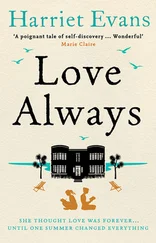Ann Beattie - Love Always
Здесь есть возможность читать онлайн «Ann Beattie - Love Always» весь текст электронной книги совершенно бесплатно (целиком полную версию без сокращений). В некоторых случаях можно слушать аудио, скачать через торрент в формате fb2 и присутствует краткое содержание. Год выпуска: 2011, Издательство: Vintage, Жанр: Современная проза, на английском языке. Описание произведения, (предисловие) а так же отзывы посетителей доступны на портале библиотеки ЛибКат.
- Название:Love Always
- Автор:
- Издательство:Vintage
- Жанр:
- Год:2011
- ISBN:нет данных
- Рейтинг книги:5 / 5. Голосов: 1
-
Избранное:Добавить в избранное
- Отзывы:
-
Ваша оценка:
- 100
- 1
- 2
- 3
- 4
- 5
Love Always: краткое содержание, описание и аннотация
Предлагаем к чтению аннотацию, описание, краткое содержание или предисловие (зависит от того, что написал сам автор книги «Love Always»). Если вы не нашли необходимую информацию о книге — напишите в комментариях, мы постараемся отыскать её.
Love Always — читать онлайн бесплатно полную книгу (весь текст) целиком
Ниже представлен текст книги, разбитый по страницам. Система сохранения места последней прочитанной страницы, позволяет с удобством читать онлайн бесплатно книгу «Love Always», без необходимости каждый раз заново искать на чём Вы остановились. Поставьте закладку, и сможете в любой момент перейти на страницу, на которой закончили чтение.
Интервал:
Закладка:
“So give me a call if you’d like to hear some music sometime,” he said, standing.
“Now I don’t get it,” she said.
“Get what?”
“Do you just think it’s weird having me here?”
“Yeah,” he said. “It’s pretty weird.”
She shook her head.
“I mean, it seems like there’s Stephanie Sykes, and then there’s you. Not that you don’t look like her,” he said, laughing.
“What do you mean, there’s me?”
“It’s like you’re a regular person. I wasn’t sitting here thinking about the person you play on TV.”
“Is that a compliment?”
“Just something I was thinking,” he said.
She was looking at him.
“I didn’t mean it as a put-down or anything. Sure; it was a compliment. I guess I never thought about you in real life.”
“Yeah,” she said. “A lot of me goes into my character, but other stuff goes into being me.”
“It was nice getting to know you,” he said. “Do you want another drink or anything?”
“I won’t keep you.”
“No. Really.”
“No. I’m not going to keep you.”
“Well, I got Eddie to take over for me in the kitchen. You might as well keep me. I don’t have any more orange juice, though. Maybe we could go over to Raindance.”
She knew they wouldn’t serve her. Even with eye makeup, she’d never pass.
“No thanks,” she said.
“Okay,” he said. “Let me know if you ever feel like hearing some music.”
“I’ll probably be leaving soon.”
“Oh yeah? Going back to California?”
“Sure. This was just a vacation.”
They were both standing in the room facing each other. He put his beer bottle on the table.
“Your aunt lives in town, huh?”
She nodded.
“Did you tell her you were coming over here?”
“Why do you ask that?”
“Just wondering.”
“She just figures I’m hanging out,” Nicole said.
“That’s cool,” he said.
“I don’t see any point in telling her. You know?”
He nodded his head. “You’re sixteen, huh? When are you going to be seventeen?”
“Why do you care about that?”
“Wondered when your birthday was.”
“September,” she said.
“Virgo?”
“Yeah.”
“I’m Pisces. Not a bad mix.”
“I never can remember,” she said. She knew that her mother was a Scorpio. Piggy Proctor was a Gemini.
“I’ve got a book,” he said, gesturing toward the refrigerator.
“I guess I sort of believe that stuff,” she said.
“It works out a lot of the time.”
“Do you have a girlfriend?” she said.
“Not really,” he said. He looked at her. “You’ve got to have friends to hang out with, right?”
“Uh huh,” she said.
A breeze was blowing through the window at the foot of the bed. She walked to the window and looked out. Stretching to look as far as she could, she saw beside the inn the croquet field that they had walked through coming down the hill to the apartment. No one was there. He came over to where she stood by the window. She sat on the foot of the bed and continued to look out. He was making a move, finally, and she knew it. He must have known she was striking a pose. “Do you ever play croquet?” she said.
In the movies he would have seized her on that line.
“We could do that later,” he said. He came a step closer.
“This isn’t some joke, right?”
“No,” she said.
“Nobody knows where you are.”
“No,” she said. “I told you: I didn’t see any point in saying anything.”
“That the way you generally feel about stuff like this?”
She nodded.
“Yeah,” he said, coming close enough that he touched her. “I guess it figures that you wouldn’t have gotten where you are by being a dummy.”
18

ANDREW STEINBORN, ghostwriter of Puts and Calls for Fun and Profit , author of Mazie, the Mouse Who Came to Stay , and I Will Always Love You , the unauthorized biography of Dolly Parton, was in reality a novelist. He had completed his first, after his nonfiction achievements, while a student at Iowa; it concerned a talented, misunderstood man who never completed novels. It was taken to be comic by his professor, and after being stunned in the conference, Steinborn decided to go along with this notion. “Evelyn Waugh couldn’t have done these scenes better,” the professor said. “You’ve created a character who has no humanity, no humor, no saving graces — but I warn you, the reviewers are going to pounce because you’ve been so uncompromising.” The novel — the first Steinborn had finished, although he had worked on four others before he went to Iowa — was never published and never reviewed, though after a year of getting up at six to write for two hours before jogging and going to work, he had recently completed a novel called Buzz , which was about people at a fashionable resort in Southampton, as seen from the perspective of a mosquito.
Like F. Scott Fitzgerald, he was also waiting for the call from his agent to tell him the book was sold, so that he could use this good news to persuade Lillian Worth, the woman he loved, to marry him. She was a nurse who had quit her job at Mass. General and moved to Iowa to live with him his last six months there. Creativity was just in the air: she had written about a dozen poems. It was Andrew’s idea that she might put together a book of verse for the terminally ill and dying — a realistic yet inspirational, no-holds-barred book influenced by her reading of Elisabeth Kübler-Ross and her personal experience of watching people die. She thought of them as people who had died, not, as all her colleagues did, as patients who had passed. “Passed” seemed a silly euphemism; it carried with it, for Lillian, connotations of life being a long exam, and then at the end the payoff was death.
Lillian had moved back to Massachusetts a month before Andrew left Iowa. She was almost out of money, and the money he was inheriting wouldn’t materialize for two or three months. She had found out that she could get her job back at Mass. General, and as long as Andrew was now willing to move back to the East Coast, she thought that it made sense to leave early. Things had gone well in Iowa City — good but not great — and she thought he was being crazy when he talked about her departure as her “leaving him.” She was going back to find an apartment during the summer, before everyone got back into town in late August to start school; her friend had a lead on a railroad flat on a street behind Porter Square. She hoped that the apartment was as good as her friend made it seem. She was sure that if she and Andrew could live in a sunny, spacious apartment, many of the problems they had would disappear; it had been close quarters in the converted garage they lived in on a farmer’s property just outside the city.
Lillian had had no intention of seeing anyone else when she got back to Boston. When she told Andrew that, it was certainly the truth. He took her to the airport and they said goodbye. He liked public passion, and she was learning to tolerate it. He attracted a lot of attention even when they weren’t touching, because he dressed in amusing suits with boxy jackets and wide legged pants. In the winter he wore a fedora.
“Don’t leave me,” he said, clutching her to him at the airport.
“Shit, man, be cool,” a man who was stacking peanuts in a vending machine said.
Andrew loved it that the man had entered into their conversation. That was real life: just try to put that in a novel and have people believe it.
Читать дальшеИнтервал:
Закладка:
Похожие книги на «Love Always»
Представляем Вашему вниманию похожие книги на «Love Always» списком для выбора. Мы отобрали схожую по названию и смыслу литературу в надежде предоставить читателям больше вариантов отыскать новые, интересные, ещё непрочитанные произведения.
Обсуждение, отзывы о книге «Love Always» и просто собственные мнения читателей. Оставьте ваши комментарии, напишите, что Вы думаете о произведении, его смысле или главных героях. Укажите что конкретно понравилось, а что нет, и почему Вы так считаете.











